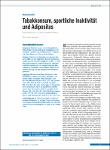Tabakkonsum, sportliche Inaktivität und Adipositas: Assoziationen mit dem sozialen Status
Smoking, Physical Inactivity, and Obesity: Associations With Social Status
Lampert, Thomas
Hintergrund: Analysiert werden sozialstatusspezifische Unterschiede in der Verbreitung des Tabakkonsums, der sportlichen Inaktivität und der Adipositas bei 18-jährigen und älteren Männern und Frauen in Deutschland. Methoden: Datenbasis ist der telefonische Gesundheitssurvey 2003, der vom Robert Koch-Institut zwischen September 2002 und Mai 2003 durchgeführt wurde (n = 8 318). Betrachtet werden der aktuelle Rauchstatus, sportliche Inaktivität und Adipositas. Der soziale Status wird über Angaben zur schulischen und beruflichen Bildung, zur beruflichen Stellung und zum Haushaltsnettoeinkommen gemessen. Ergebnisse: Männer mit niedrigem Sozialstatus haben im Verhältnis zu Männern mit hohem Sozialstatus eine erhöhte Chance zu rauchen (Odds Ratio [OR] = 1,89; 95-%-Konfidenzintervall [95-%-KI] = 1,53–2,34), sportlich inaktiv (OR = 2,30; 95-%-KI = 1,87–2,84) und adipös (OR = 1,34; 95-%-KI = 1,02–1,77) zu sein. Für Frauen sind beim Tabakkonsum und bei der sportlichen Inaktivität ebenso große Statusunterschiede festzustellen wie bei Männern (OR = 1,63; 95-%-KI = 1,30–2,09 beziehungsweise OR = 1,91; 95-%-KI = 1,58–2,33), bei der Adipositas sind sie noch deutlicher (OR = 3,20; 95-%-KI = 2,46–4,18). Schlussfolgerung: Die Ergebnisse weisen Personen mit niedrigem Sozialstatus als wichtige Zielgruppe für präventive und gesundheitsfördernde Maßnahmen aus, und zwar sowohl für die Gesundheitspolitik als auch für die ärztliche Praxis. Background: The author analyzed social-status-specific differences in tobacco smoking, physical inactivity, and obesity among men and women aged 18 years and above in Germany. Methods: The 2003 Telephone Health Survey carried out by the Robert Koch Institute from September 2002 to May 2003 (n = 8318) provided the data for this study. The subjects’ current smoking status, physical inactivity, and obesity were assessed. Their social status was judged on the basis of the information they gave about their -education and professional training, occupational position, and net household income. Results: Men of low social status were found to be more likely to smoke (OR = 1.89, 95% CI = 1.53–2.34), to be physically inactive (OR = 2.30, 95% CI = 1.87–2.84), and to be obese (OR = 1.34, 95% CI = 1.02–1.77) than men of high social status. For women, social status had just as large an effect on smoking and physical inactivity as it did in men (OR = 1.63, 95% CI = 1.30–2.09; and OR = 1.91, 95% CI = 1.58–2.33, respectively), while its effect on obesity was even greater than in men (OR = 3.20, 95% CI = 2.46–4.18). Conclusion: These results imply that persons of low social status should be an important target group for preventive and health-promoting measures, both in health policy and in medical practice.
No license information

